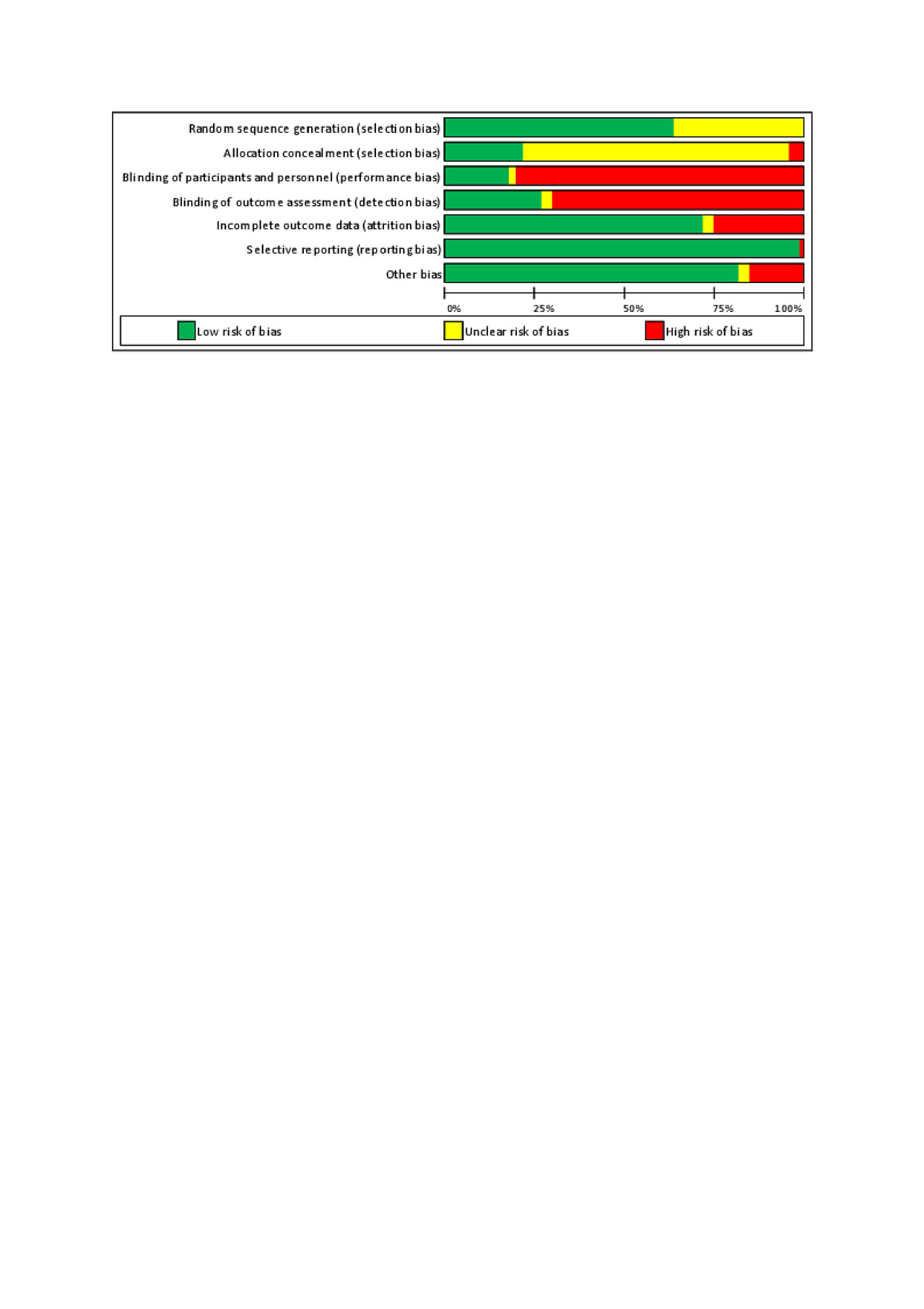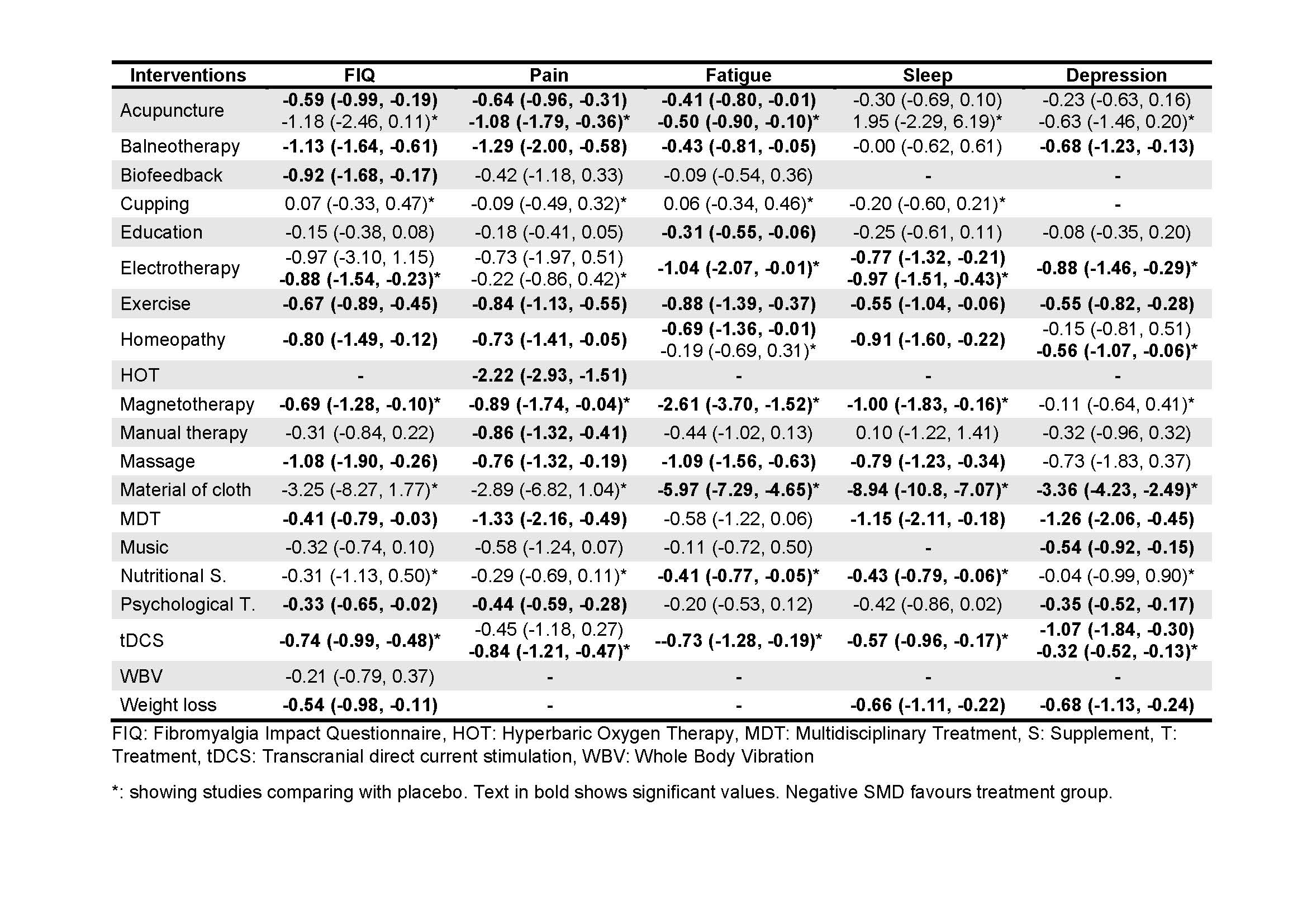Session Information
Date: Sunday, November 10, 2019
Title: 3S075: Fibromyalgia & Other Clinical Pain Syndromes (827–832)
Session Type: ACR Abstract Session
Session Time: 2:30PM-4:00PM
Background/Purpose: Non-pharmacological interventions are recommended as first-line treatment for fibromyalgia (FM)1. However, the evidence base supporting this has not been updated comprehensively, and the recent EULAR guideline was only based on a review of systematic reviews. The objective of this study was to assess the efficacy of non-pharmacological interventions on disease specific quality of life (FM Impact Questionnaire (FIQ)), pain, fatigue, sleep and depression in fibromyalgia.
Methods: MEDLINE, EMBASE, AMED, PsychINFO, CINAHL, Web of Science were systematically searched from their dates of inception until September 2018. In addition, the first 100 articles on Google Scholar were included. Randomised controlled trials (RCTs) comparing any non-pharmacological intervention versus usual care, no treatment, waiting list or placebo in patients with FM aged >16 years were included without language restriction. FIQ was the primary outcome of interest. Standardised mean difference (SMD) and 95% confidence interval (CI) were calculated using random effects model. The risk of bias was evaluated using modified Cochrane‘s tool.
Results: 16,251 studies were identified, and 148 RCTs (n=9,598) met all inclusion criteria. 89% patients in the included studies met ACR’s 1990, 2010 or 2016 diagnostic criteria for FM. 109 studies (n=7,677) compared active treatment to usual care, waiting list or no treatment; and 39 (n=1,921) compared treatment with placebo or sham treatment. In total, 20 non-pharmacological interventions were evaluated. 52% trials had sample size < 50, and were at high risk of bias, especially on blinding (Fig 1).
Exercise (pooled for any type of exercise) was the only intervention associated with significant improvements for all five outcomes [FIQ (SMD=-0.67; 95% CI -0.89, -0.45), pain (-0.84; 95% CI -1.13, -0.55), fatigue (-0.88; 95% CI -1.39, -0.37), sleep (-0.55; 95% CI -1.04, -0.06) and depression (-0.55; 95% CI -0.82, -0.28)]. Psychological treatments including cognitive behavioural therapy and mindfulness were significantly more efficacious than usual care for FIQ, pain and depression but showed no improvement for fatigue and sleep (Table 1). All exercise types were effective at relieving pain (Fig 2). Mind body and strengthening exercises were effective at improving fatigue, while aerobic and strengthening exercises were effective at improving sleep. However, aerobic exercise had greater magnitude of effect on sleep than strengthening exercise. All exercise types except for aerobic exercise improved depression.
Conclusion: Non-pharmacological interventions are beneficial for FM. Exercise appears to be the most promising non-pharmacological intervention for relieving FM symptoms, although different exercise types benefit different outcomes. This suggests that different types of exercise should be prescribed to patients depending on their predominant symptoms.
1) Macfarlane, G.J., Kronisch, C., Dean, L.E., Atzeni, F., Häuser, W., Fluß, E., Choy, E., Kosek, E., Amris, K., Branco, J. and Dincer, F., 2017. EULAR revised recommendations for the management of fibromyalgia. Annals of the rheumatic diseases, 76(2), pp.318-328.
To cite this abstract in AMA style:
Kundakci B, Kaur J, Goh S, Hall M, Doherty M, Zhang W, Abhishek A. The Efficacy of Non-Pharmacological Interventions for Fibromyalgia: A Systematic Review with Meta-Analysis [abstract]. Arthritis Rheumatol. 2019; 71 (suppl 10). https://acrabstracts.org/abstract/the-efficacy-of-non-pharmacological-interventions-for-fibromyalgia-a-systematic-review-with-meta-analysis/. Accessed .« Back to 2019 ACR/ARP Annual Meeting
ACR Meeting Abstracts - https://acrabstracts.org/abstract/the-efficacy-of-non-pharmacological-interventions-for-fibromyalgia-a-systematic-review-with-meta-analysis/



